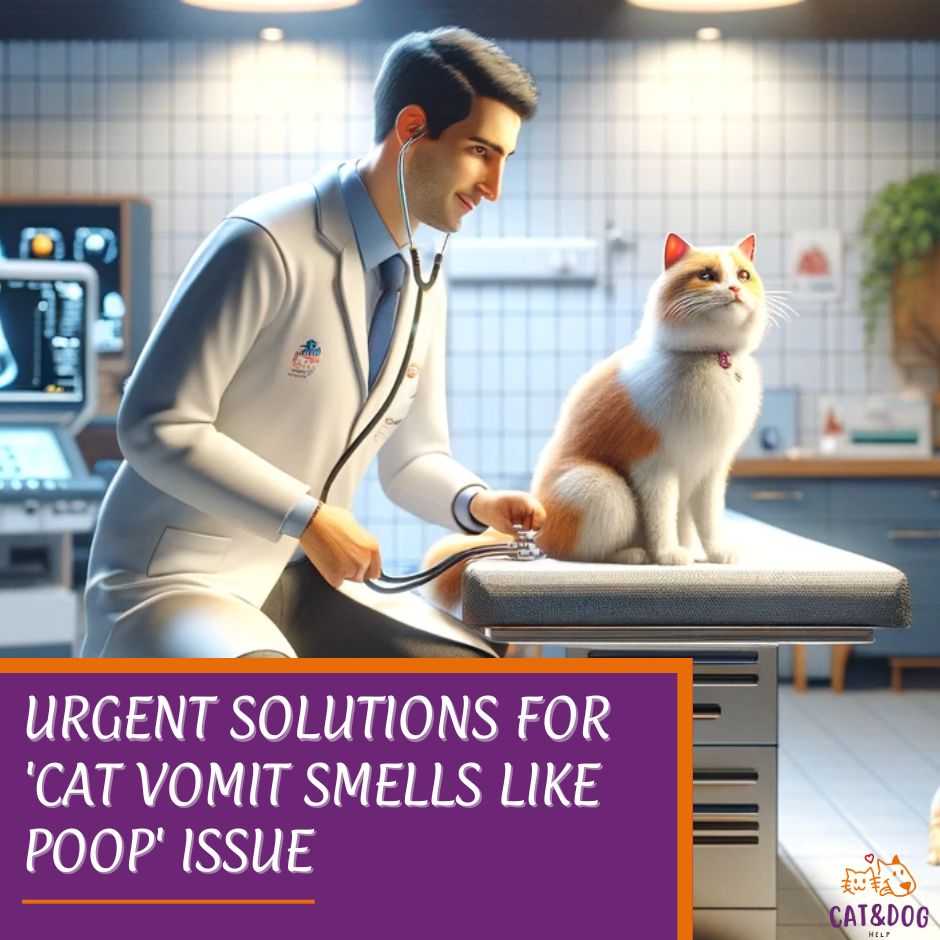Why does cat vomit smells like poop?
When your cat vomits, it’s usually an unpleasant experience for both of you — the mess, the concern, and of course, the smell.
But if you notice the vomit smells particularly like poop, it’s something that shouldn’t be ignored, especially for any pet owners. You might wonder, “Is this normal?”
Vomiting in cats can be occasional and harmless, but when it comes with a smell that turns your nose, it’s time to pay closer attention to cat vomiting and potential underlying causes, such as the presence of bile, which can indicate a possible ulcer in the stomach or pancreatitis.
Red blood is a sign of bleeding in the upper gastrointestinal tract, and it is important to seek veterinary attention if this is the case.
As a cat owner, it’s important to be aware of any changes in your cat’s behavior or health and seek veterinary attention if necessary.
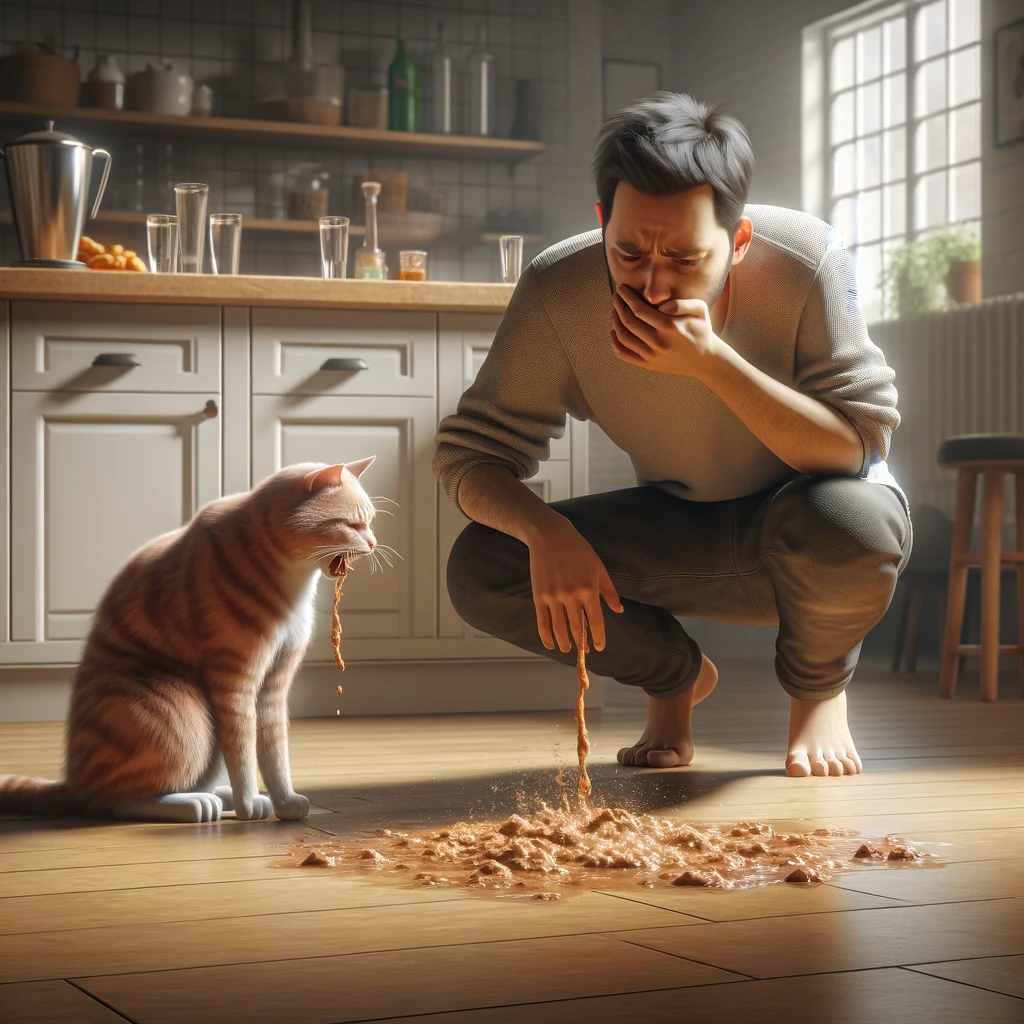
Understanding the why’s and how’s of your feline friend’s vomiting can give you insight into their health and what your next steps should be.
Sometimes, what seems to be vomit is actually regurgitation, a less concerning process where undigested food comes back up without the abdominal heaving.
But let’s say it’s true vomiting accompanied by a fecal odor; this could indicate a potential food allergy, poisoning, or other serious internal issues as the cause of your cat’s vomiting for a variety of reasons, including eating too much food or spoiled wet food. (1)
It’s like your cat is telling you, “Hey, keep a close eye on this, I need some help here with my upset tummy, especially since I’m just a little kitten!”
If your kitten is vomiting frequently or in large amounts, it is a good idea to determine the underlying cause of nausea and seek veterinary attention immediately to ensure your cat’s health.
Your veterinarian can perform a physical examination, run diagnostic tests, and provide appropriate treatment to address any underlying medical conditions such as megaesophagus, a disorder affecting the esophagus muscles, that may be causing the vomiting of food or kitten fecal matter.
This is a serious issue that requires immediate attention in order to ensure your cat’s health and well-being.
It’s important to understand the cause of your kitten’s vomiting, especially when fecal matter is present, in order to properly address and treat the issue of an upset tummy caused by worms or other underlying health issues.
Key Takeaways
- Cat vomit that smells like poop may signal a digestive issue.
- It’s important to observe your cat’s vomiting patterns and overall behavior.
- Consulting with a vet can lead to a proper diagnosis and treatment.
Why Does Cat Vomit Smells Like Poop?
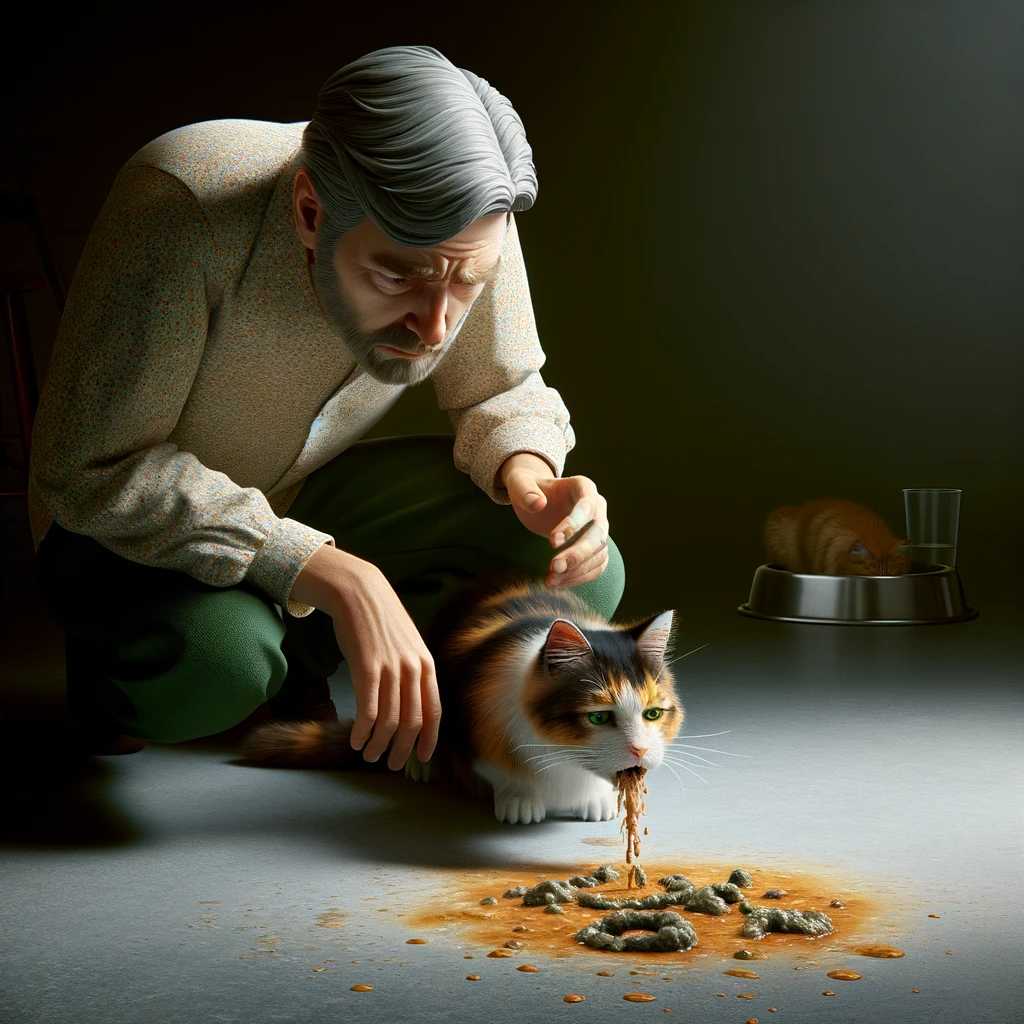
Ever been perplexed when your cat’s vomit had a peculiar aroma, similar to poop? It’s not just a quirky occurrence—it could indicate a health issue.
Don’t fret, though; we’re here to explore the possible culprits behind this stinky situation.
Gastrointestinal Obstructions: Imagine your cat’s intestines as a highway; when there’s a blockage, traffic jams up, right? (2)
That’s what happens when your furry friend ingests something they shouldn’t have, causing an obstruction.
- Signs of trouble: Vomit smelling like poop is a red flag. This can happen when food can no longer pass through and ferment, releasing foul odors.
Infections and Parasites: Bugs in the system, be they bacterial or parasitic, can also cause tummy upsets.
- Tell-tale symptoms: Diarrhea, general malaise, and yup, smelly vomit.
Metabolic and Endocrine Disorders: These are the sneaky, internal issues like kidney disease or diabetes.(3)
- What to watch out for: Thirst, weight changes, and changes in appetite—and in our topic’s case, unusually scented vomit.
If you’ve got a whiff of an off-smell from your cat’s vomit, it’s smart to play detective. While sometimes the smell could simply be due to their last meal, persistent or extremely foul odors aren’t something to ignore.
Remember, cats are masters at hiding discomfort, so it’s up to you to spot the signs.
Should you find yourself facing this smelly mystery, a vet visit is the best course of action. They’ll give you the lowdown, probably minus the poop-scented details.
Your kitty will thank you—hopefully with a purr, not another unpleasant surprise!
Remedies and Preventive Measures
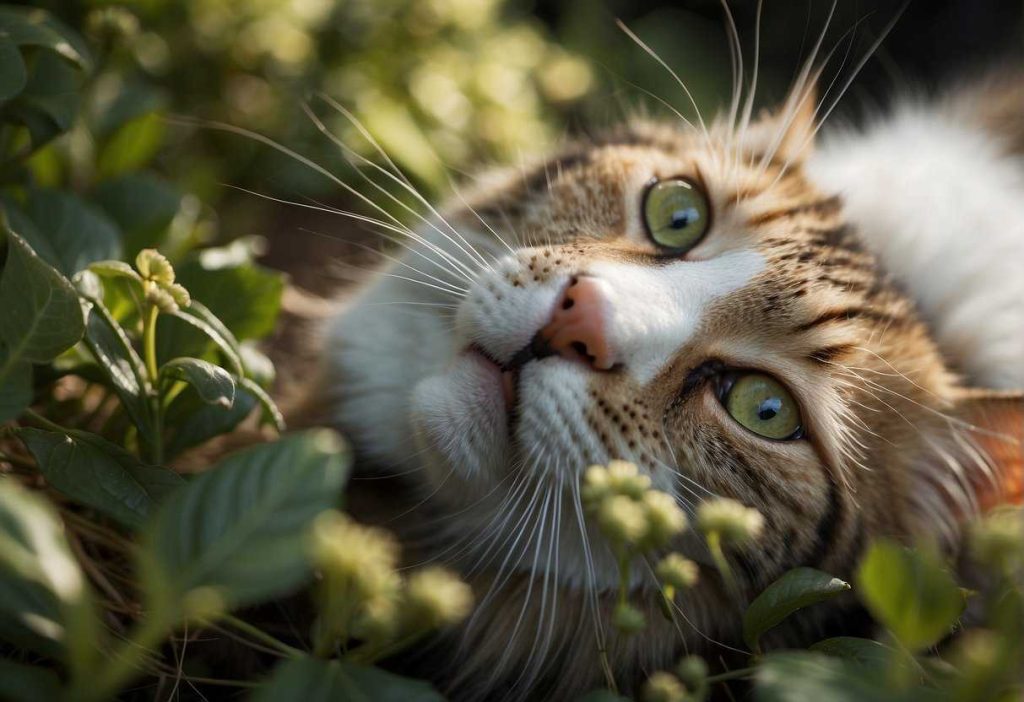
Experiencing a bit of a stinky situation with your feline friend’s vomit smelling like the litter box? Don’t fret; it happens!
Let’s talk about how you can give a paw to your kitty in the comfort of your home and what habits you can adopt to prevent future episodes.
Immediate Care:
- Ensure Hydration: Offer water to your cat. Dehydration can follow vomiting, and it’s crucial to keep them hydrated. (4)
- Temporary Fasting: If vomiting persists, consider withholding food for 12-24 hours, but always provide water.
- Bland Diet: Gradually reintroduce food with a bland, easily digestible diet such as boiled chicken or white fish.
Now, when should you shift gears from home remedies to vet intervention? If you notice continuous vomiting, blood in vomit, lethargy, or if the vomit’s smell is consistently foul, it’s time for professional help.
Preventative Measures:
- Optimize Diet: Feed high-quality, easily digestible cat food to reduce stomach upset.
- Regular Vet Visits: Schedule routine check-ups for early detection of any underlying issues.
- Parasite Control: Ensuring your cat is up-to-date on deworming keeps those uninvited guests away from causing internal havoc.
Maintaining your cat’s healthy digestion through a balanced diet and regular veterinary check-ups can significantly reduce the risk of vomiting episodes that may result in unpleasant odors.
Remember, the goal isn’t just to mask symptoms but to prevent them from being part of your and your cat’s lives.
Keep an eye on what your cat eats, watch for unusual behavior, and always keep a line open to your vet. Your quick action can turn a smelly situation into just a hiccup in your cat’s nine lives!
Diagnostic Approaches and Veterinary Care

When your cat’s vomit smells unusually foul, like poop, it can be a sign that something’s not quite right internally.
But hey, isn’t that what you’ve got your friendly vet for? Absolutely! Let’s explore how your vet may approach the situation.
Consulting Your Veterinarian: First things first, whisking your furry friend to the vet is a must. Why? Because your vet can figure out what’s messing with your kitty’s tummy through a series of:
- Physical Examinations: Just like a detective, your vet examines your cat from nose to tail.
- Laboratory Tests: Think about bloodwork, stool samples, and maybe a urinalysis to get to the nitty-gritty of the issue.
- Imaging: X-rays or ultrasounds can peek inside your cat’s belly to spot any blockages or other abnormalities.
Got the picture? Great!
Deciphering the Diagnosis: Now, if your vet concludes that it’s an intestinal blockage or another condition, they will chart out a treatment quest. This could include:
- Medication: To treat infections or inflammation.
- Dietary Changes: To soothe that sensitive stomach.
- Surgery: In serious cases, like if there’s an obstruction that needs removing.
Remember, each kitty’s path to recovery will be unique, and your vet may recommend a tailored plan for your whiskered pal.
Caring for Your Cat: Post-diagnosis, your cat may need ongoing care. Support your cat with:
- Proper hydration
- Consistent administration of any prescribed treatments
- Frequent check-ups as advised by your vet
And there you have it! A well-informed pet parent, ready to tackle whatever tummy troubles come your feline’s way. Keep up the good work, and your kitty will be purring happily again in no time. (5)
Enhancing Understanding with Veterinarian Insights
Veterinarians pinpoint that one common culprit behind this foul smell could be intestinal blockages. It’s like a traffic jam inside your kitty; nothing gets through, and the result isn’t pretty. (6)
A blockage can lead to vomit that contains partially digested food mixed with waste, making it smell like poop.
Understanding the potential reasons for this unpleasant phenomenon is crucial, especially when it comes to the health of your cat’s digestive tract, and it’s always advised to consult your veterinarian for expert insights and the best treatment options.
Here are a few things that vets warn about:
- Infections: Little critters aren’t just adorable names for your cat; sometimes, they’re unwanted guests causing havoc in their system.
- Parasites: These pesky invaders can really upset your cat’s tummy. (7)
- Metabolic diseases: Think liver or kidney issues. These internal organs can literally make or break the vomit smell.
- Endocrine diseases: Cats have hormones too, and they can throw things off balance, including digestion.
Home care, like maintaining a clean feeding station and offering a balanced diet, is important, but sometimes home remedies just don’t cut it.
For example, Jane Doe shared her story about how her cat, Whiskers, had a digestive upset that turned their living room into a no-go zone, smell-wise.
A vet visit revealed an underlying thyroid issue—something Jane couldn’t have fixed with just a fresh bowl of tuna water.
Veterinary advice is like a trusted GPS; it guides you to the right path. If your cat is creating stinky surprises, it’s time to phone a professional. They’ll have the best insight to navigate this tricky situation.
In conclusion, mix up some love with a dose of watching your cat’s health, and add a sprinkle of vet advice for the best recipe to tackle a pungent problem like vomit that smells suspiciously like poop.
Quick Recap
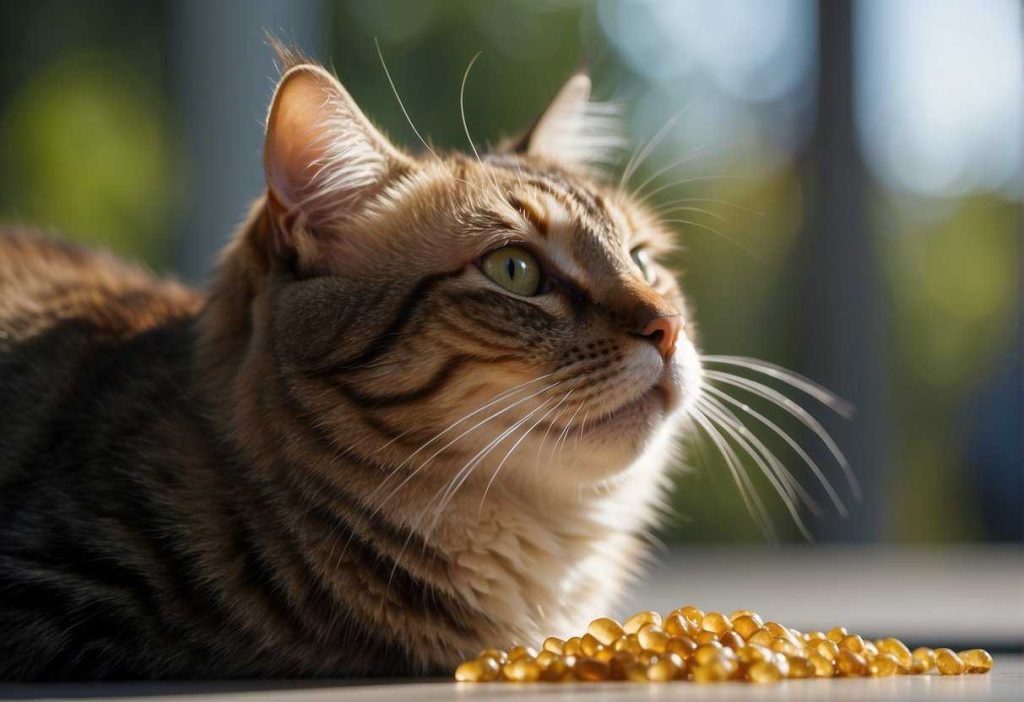
Common Causes:
- Intestinal blockages: Things like hairballs or swallowed objects can literally cause a traffic jam in your cat’s digestive highway.
- Gastrojejunocolic fistula: It’s a rare condition but worth mentioning as it can mix contents from the intestines and stomach.
- Liver issues: Brown bile can sometimes make an appearance, and it’s not a good sign.
What Can You Do About It?
- Health Check: Regular vet visits are a must, particularly when things go awry.
- Diet Management: Sometimes, it’s the simple answer to diet changes that can make a difference.
- Early Detection: Stay vigilant. If something seems off, it probably is.
Remember, the smell of your cat’s vomit can give you clues about what’s going on inside.
And while a one-off weird smell might not be a red flag, a consistent odor that’s reminiscent of poop warrants a chat with your vet, stat.
You now know how to spot when something’s up, but the best medicine is prevention. Keep those regular health checks, and don’t forget to give your furball plenty of love—it’s good for both your hearts!
If you’re ever in doubt, though, trust your gut as much as you trust your cat’s. It’s better to be a cautious pet parent than a hesitant one when it comes to health.
Stay positive and keep a nose out for your kitty’s wellbeing!
Frequently Asked Questions
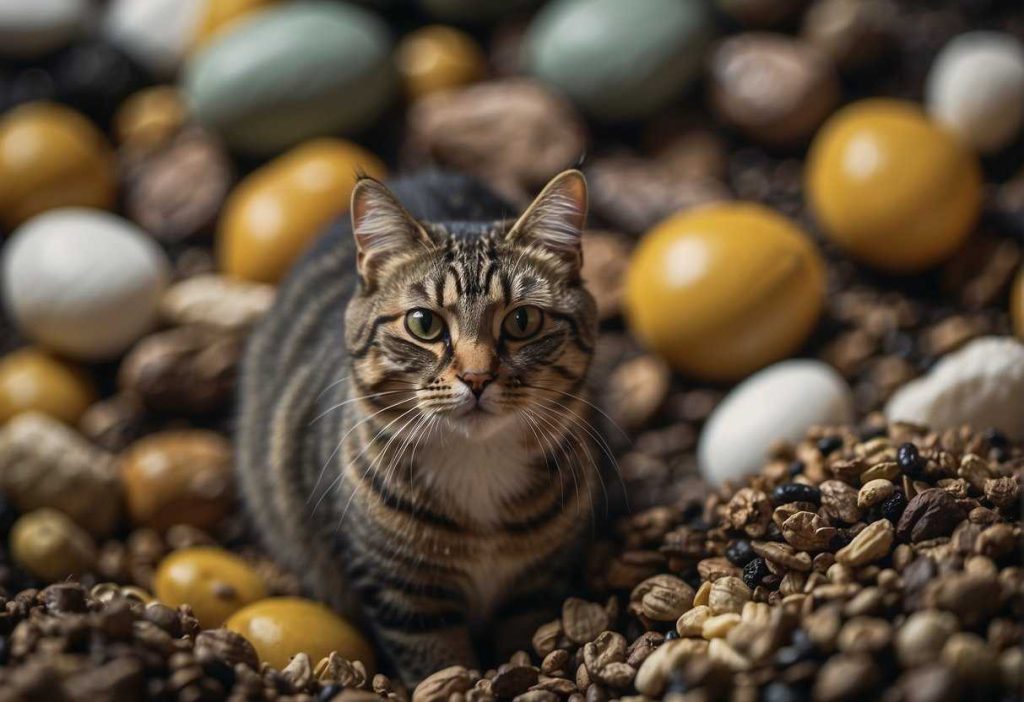
Navigating the puzzling world of cat health can be tricky, especially when unexpected symptoms like vomit that smells like feces arise.
Let’s tackle some common questions to help you understand what might be happening with your furry friend.
What Causes Cat Vomit to Smell Like Poop?
Well, it’s not a topic you’d bring up at dinner, but if your cat’s vomit smells like poop, it might be due to a condition called intestinal blockage.
This happens when the intestines are partly or completely blocked, allowing waste to mix with gastric contents.
What Immediate Actions Should I Take if My Cat’s Vomit Smells Like Poop?
Don’t panic! First, remove any food and water to prevent further vomiting. It’s crucial to contact your vet asap, as this could indicate a serious health issue.
Keep a sample of the vomit if possible – it might help your vet diagnose the problem.
Can Certain Foods Cause My Cat’s Vomit to Smell Like Poop?
In a word, unlikely. If the vomit has a fecal odor, it’s more a sign of gastrointestinal issues than food choice.
However, always monitor how your cat reacts to new foods and report any concerns to your vet.
Is Fecal-Smelling Vomit a Sign of a Serious Health Issue in Cats?
Yes, it can be. It may suggest an obstruction in your cat’s digestive system or other underlying health problems. Best to check with a vet rather than second-guess.
How urgently should I seek veterinary care if my cat’s vomit looks and smells like feces?
If you’ve hit the ‘my cat’s vomit smells like poop’ panic button, press pause and call your vet immediately.
This could be a serious health emergency, and prompt veterinary care is critical.
How Can I Differentiate Between Normal Vomiting and a Serious Condition?
Occasional hairball hurling? Maybe not a red flag.
But vomiting that’s frequent, has a foul odor, or is accompanied by other symptoms like lethargy – those are alarm bells that should send you straight to the vet’s office.
What Preventative Measures Can I Take to Avoid Future Vomiting Episodes?
Keep an eye on your cat’s diet and avoid giving them anything that isn’t part of their regular cat food.
Regular veterinary check-ups are key, and ensure your home is free of small objects or toxins that curious kitties may ingest.
- Where to find the most trustworthy real money casinos - August 7, 2025
- Online Casinos That Approve PayPal: The Ultimate Overview - August 7, 2025

